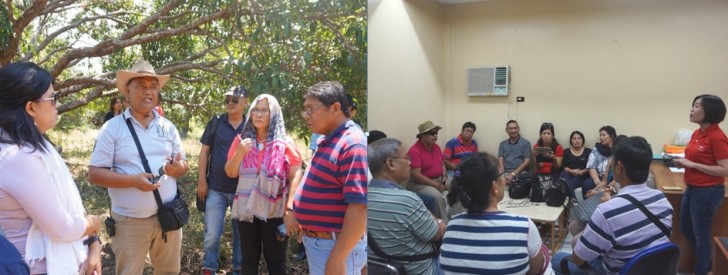 The participants getting tips and recommendations from mango production and processing experts they have visited during their exposure trip in Iloilo and Cebu.
The participants getting tips and recommendations from mango production and processing experts they have visited during their exposure trip in Iloilo and Cebu. Ilocos Mango PGs visit Guimaras, Cebu and Dasol
Mango is among the commodities supported by the Philippine Rural Development Project (PRDP) in Ilocos Region. In fact, the first enterprise subproject proposed under PRDP in Ilocos Region supports the mango commodity.
With this, the Regional Project Coordination Office1 (RPCO1) Enterprise component arranged an exposure trip for Proponent Groups (PGs) including the Province of La Union Mango Industry Association, Incorporated (PLUMIA, Inc.), Pal-lim Multi-Purpose Cooperative and Cabugao Mango Farmers Association, with the Provincial Project Management and Implementation Units (PPMIU) staff members, and visited mango plantations in Guimaras and Dasol, and mango processing plants in Cebu.
In Guimaras, Engr. Rhod Orquia delivered a lecture on Guimaras mango and the various researches of the National Mango Research and Development Center. The plantation in the Center featured bonsai and grafted mango trees. The grafted mango trees, which have an average age of ten years, produce 90 to 120 kilograms of mango. According to Engr. Orquia, a provincial ordinance is implemented in Guimaras prohibiting the harvesting of mangoes that are aged less than 110 days.
Profoods International, Incorporated and M. Lhuillier Food Products, Inc. are the mango processing plants visited by the group in Cebu. Profoods allowed the group to tour their processing plant in Mandaue City. Both Profoods and M. Lhuillier plants mainly produce dried mangoes, although they also process fruits like soursoup, papaya, melon and pineapple.
Another mango plantation visited by the group is that of Dasolland. Dasolland also employs intensive mango farming method. Mango trees are distanced at 4×6 meters or 10×6 meters. The number of bearing mango trees is pegged at 3,500.
This activity is expected to encourage the participants to replicate the best agricultural practices and models of the plantations and processing plants they visited, with particular focus on the production and marketing of mangoes. Also, this has broadened the perspective of the participants on rural agricultural development particularly on mangoes. (Ilocos InfoACE)
